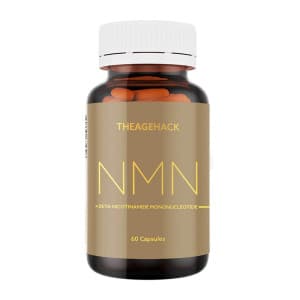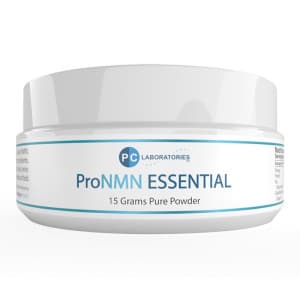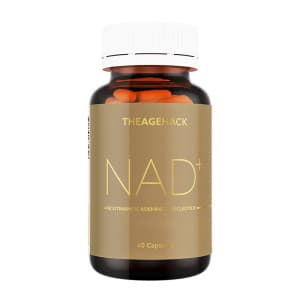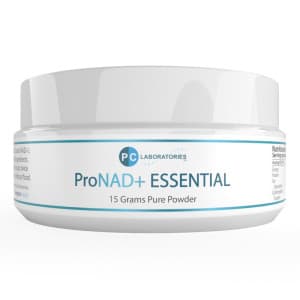NAD+ and NMN- How do they help with aging, and what’s the difference?
NAD+ and NMN have taken the supplement world by storm, becoming a quick favourite of biohackers globally. It would be extremely difficult to have a conversation about reversing the signs of aging and boosting cellular repair without the mention of either NAD+ or NMN.
But how valuable is taking these in a supplement? And how do I know which one is best suited to my body and what it currently needs? We aim to break down NAD+ and NMN supplements for you, and bring you up to speed with the anti-aging benefits.
What is NAD+?
NAD+ stands for Nicotinamide Adenine Dinucleotide. It is a vital molecule that serves as a coenzyme in our cells in order for many metabolic processes to occur. NAD+ plays a huge role in fueling the mitochondria of our cells- also known as our energy generator.
Plants, bacteria, humans and other mammals all require NAD+ for cellular energy. Having great levels of NAD+ helps to keep our DNA functioning well, take energy from the food we eat and protect our cells from disease.
What does NAD+ help with?
The ‘Golden Nucleotide’ as it is sometimes referred to by scientists does have some pretty outstanding abilities. When produced in good quantities by the body, NAD+ helps to:
- Improve DNA repair by cells
- Support healthy aging and youthfulness
- Enhance energy levels
- Regulate stress & sleep cycles
- Reduce cognitive decline
- Buffer inflammation & oxidative stress
How does the body make NAD+?
NAD+ is made in our body using three main building blocks- either a Niacin (vitamin B3), Tryptophan or Nicotinic acid source. All of these precursors are a member of the Vitamin B3 family and require energy to make NAD+ in the first place. This energy being spent means that NAD+ is preferably made in the cell in the most efficient way possible, a process hindered by a less than a healthy body.
The NAD+ works as a helper molecule, shuttling electrons back and forth so certain processes in the body can function. Without NAD+ being made from these cofactors, our body would be struggling with even the most basic tasks very quickly. Where there is NAD+, there is life.
Can I boost NAD+ naturally?
Natural ways to improve the production of NAD+ include:
- Exercise- regular aerobic and resistance exercise can help to keep NAD+ levels topped up. It has also been shown to reverse the effects of low NAD+ levels in unhealthy people.
- Fasting & restricting calories- allows more NAD+ to be available for absorption.
- Avoid high fat/sugar diets- an excess causes an overload on the mitochondria, and depletes available NAD+.
- Heat/cold exposure- mild stress from changes in temperature show enhanced NAD+ levels, and a reduction in depletion.
Remember these studies are done safely in controlled conditions, and the results are seen in healthy people.
What could boosting my NAD+ levels with a supplement do?
When levels of NAD+ are supported, individuals show lower levels of weight gain, better insulin balance and an improvement in liver enzyme production. Rates of obesity, cardiovascular disease and Type II Diabetes are lower in individuals with adequate NAD+.
NAD+ levels can rapidly decline as we get older, at a cellular and tissue level. The shuttling process can become slower, and stress from lifestyle choices can decline things even further. This is your sign to do something active today, your mitochondria will thank you for it.
Lower levels of NAD+ in the aging population is related to higher levels of inflammation and much lower levels of NAD+ being produced. There is a tendency to lead much more sedentary lifestyle as we age, possibly with great negative effects on how we feel. All the more reason to be looking into natural ways to increase NAD+!
What is NMN and what can it do for me?
Nicotinamide Mononucleotide (NMN) is a natural molecule that is present in all life forms and is partly derived from Niacin (B3). NMN serves as a building block for our body to make NAD+. Although there are other precursors to make NAD+, NMN has been studied for use as a supplement to enhance NAD+ production in humans.
Interestingly, NMN can be found in small amounts in certain fruits and vegetables, like cabbage, broccoli and avocado. NMN production can be hindered by inadequate intake of Niacin (Vitamin B3), and in people with metabolic disorders like Obesity and Diabetes Type II. Having enough NMN to make NAD+ is crucial for the anti-aging, and disease protective properties that are related.
How do I know whether to take NAD+ or NMN?
We know NMN can be found in certain foods, yet trying to eat enough of these fruits and vegetables to gain great levels of NAD+, will not be enough to keep levels up. Great results have come from supplementing NMN for longevity, and even in combination with taking NAD+ as a supplement. Honestly, both NAD+ and NMN are crucial to reducing the effects of aging, preventing chronic disease and increasing vitality.
NAD+ may provide more of a direct line to cellular repair and give a great boost to the anti-aging process. Yet the precursors like NMN are not to be forgotten, with studies showing that it is easily transported into our cells and converted to energy. Research on improving obesity outcomes, blood sugar and blood cholesterol levels are also looking positive.
Let’s wrap it up…
Supplementing with NAD+ or NMN or trying a combination of both certainly seems to be an important step on the journey to reducing the signs of aging, and possibly even reverse some damage. The environment, stress, toxins and disease can really take their toll on our health and wellbeing.
No supplement regime is complete without adding in the benefits of regular exercise, and consuming a nutritious diet full of fruits and vegetables. Staying young is not just about how we look on the outside, but about what’s really going on at a deeper level that makes us truly feel healthier. Check out The Age Hack to learn more about Anti-Ageing!





